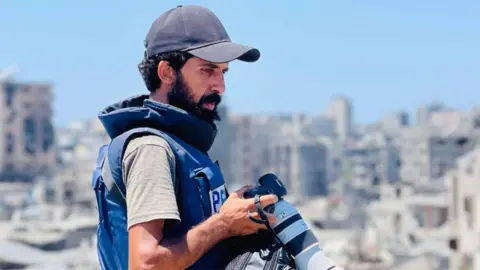 British Broadcasting Corporation
British Broadcasting CorporationDuring the Israel-Gaza war, Facebook severely limited the ability of Palestinian news outlets to reach their audiences, according to research by the BBC.
In a comprehensive analysis of Facebook data, we found that newsrooms in the Palestinian territories (Gaza and the West Bank) have experienced a sharp decline in audience engagement since October 2023.
The BBC has also seen leaked documents showing that Instagram, another platform owned by Meta, stepped up moderation of Palestinian user comments after October 2023.
Meta, Facebook's owner, said any suggestion that Facebook was deliberately suppressing certain voices was "patently false."
Since the outbreak of the Gaza war, only a few foreign journalists have been allowed to enter the Palestinian Gaza coastal area from the outside, and they can only do so under the escort of Israeli troops.
Social media fills a void for those who want to hear more voices from within Gaza. The Facebook pages of news outlets such as Palestinian Television, Wafa News Agency, and Palestinian Watan News Agency (these organizations operate out of West Bank territory) have become important sources of up-to-date information for many people around the world.
BBC News Arabic compiled engagement data on the Facebook pages of 20 prominent Palestinian news organizations before and one year after the Hamas attack on Israel on 7 October.
Engagement is a key metric for measuring the impact of a social media account and how many people see its content. It includes factors such as number of comments, number of reactions, and number of shares.
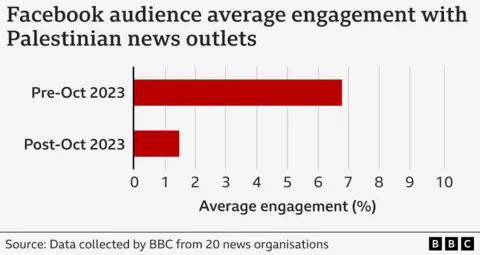
In times of war, audience participation may rise. However, the data showed a 77% drop after the Hamas attack on October 7, 2023.
Palestinian Television has 5.8 million fans on Facebook. Statistics newsroom reporters shared with us show a 60% drop in the number of people seeing their posts.
"Interaction is completely limited and our posts are not reaching people," said Tariq Ziad, a reporter for the channel.
Over the past year, Palestinian journalists have worried that their online content has been subject to Meta's "shadow ban" - in other words, limiting the number of people who can view the content.
To test this, we conducted the same data analysis on the Facebook pages of 20 Israeli news organizations, including Yediot Ahronot, Israel Hayom, and Channel 13. These pages, which also posted a lot of war-related content, saw nearly a 37% increase in audience engagement.
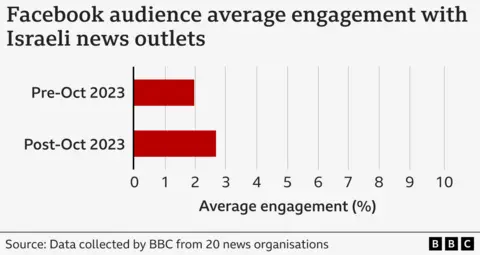
Mehta has previously been accused by Palestinians and human rights groups of Failure to fairly moderate online activity.
An independent report commissioned by the company in 2021 said this was not intentional but was due to a lack of Arabic language expertise on the part of moderators. Words and phrases are interpreted as offensive or violent when in fact they are harmless.
For example, the Arabic phrase "Alhamdulillah" means "Praise God" and is sometimes automatically translated as "Praise God, Palestinian terrorists are fighting for freedom."
To see if this could explain the decline in Palestinian media engagement, the BBC conducted the same analysis on its Facebook page with 30 prominent Arabic-language news sources from other regions, such as Sky News Arabia and Al Jazeera.
However, these pages saw an average increase in engagement of almost 100%.
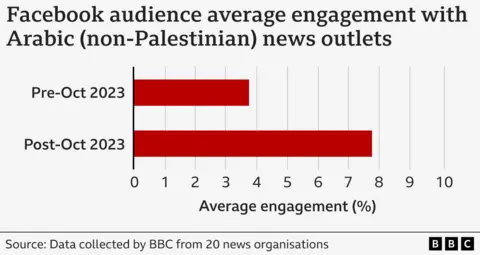
In response to our research, Meta noted that it had made no secret of the "temporary product and policy measures" it would take in October 2023.
It said it faces challenges in balancing the right to free speech because Hamas is both subject to U.S. sanctions and designated as a dangerous organization under Mehta's own policies.
The tech giant also said pages dedicated to posting about the war were more likely to impact engagement.
A spokesman said: "We acknowledge we make mistakes, but any suggestion that we deliberately suppress specific voices is unequivocally false."
Instagram files leaked
The BBC also spoke to five former and current Meta employees about the impact they said the company's policies had on individual Palestinian users.
An anonymous source has shared leaked internal documents about Instagram algorithm changes that increase Palestinian moderation of comments on Instagram posts.
“Within a week of the Hamas attack, the code was essentially changed to make it more aggressive against the Palestinian people,” he said.
An engineer expressed concern about the order, fearing it could "bring new biases into the system against Palestinian users," according to internal sources.
Meta confirmed it had taken the step but said it was necessary to respond to a "surge in hateful content" coming from the Palestinian territories.
It said policy changes implemented at the start of the Israel-Gaza war had now been reversed, but did not say when that would happen.
According to reports, at least 137 Palestinian journalists have been killed in Gaza since the conflict began, but a handful of journalists continue to move forward despite the dangers.
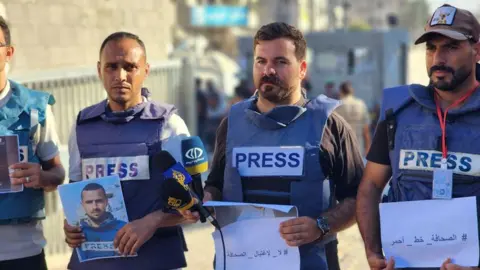 Getty Images
Getty ImagesOmar el Qataa, one of the few photojournalists, said: “A lot of information cannot be released because it is too graphic, for example, if the (Israeli) army carried out a massacre and "We filmed it so the video wouldn't go viral." He chose to stay in northern Gaza.
“But despite the challenges, risks and content bans,” he said, “we must continue to share Palestinian content.”
Additional reporting by Rehab Ismail and Natalie Merzougui
